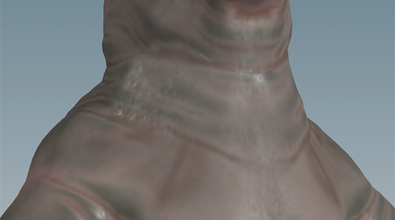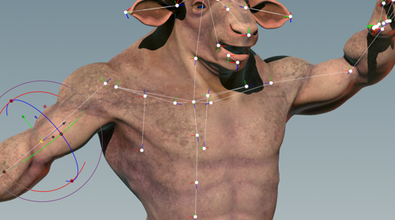Michiel Hagedoorn
michiel
About Me
Michiel Hagedoorn is a Senior 3D Scientist at SideFX.
Connect
LOCATION
Toronto,
Not Specified
WEBSITE
Houdini Skills
Availability
Not Specified
My Badges

SideFX Staff
Since Jun 2007
Recent Forum Posts
"FEM Sliade Constraint" Analog for GSL Method in FEM Solver Dec. 4, 2024, 2:22 p.m.
The "pintoanimation" feature works if you need to constrain X, Y and Z for certain points.
If you want to constrain a point to lie on a line or within a plane, you will need slide constraints, see
https://www.sidefx.com/docs/houdini/nodes/dop/femslideconstraint.html [www.sidefx.com]
As discussed earlier, these are only available in GNL solver mode and not in the deprecated GSL solver mode.
If you want to constrain a point to lie on a line or within a plane, you will need slide constraints, see
https://www.sidefx.com/docs/houdini/nodes/dop/femslideconstraint.html [www.sidefx.com]
As discussed earlier, these are only available in GNL solver mode and not in the deprecated GSL solver mode.
"FEM Sliade Constraint" Analog for GSL Method in FEM Solver Nov. 27, 2024, 3:21 p.m.
Alt_stage
Please tell me, is it possible to access the specification of boundary conditions or degrees of freedom of finite element mesh nodes? (I still really want to implement the functionality of the plane of symmetry for the GSL method.)
If no constraints are applied to an FEM object, then each point of that object's simulation geometry contributes three degrees of freedom. There are no "hidden" degrees of freedom that are invisible or inaccessible to the user; all degrees of freedom are represented using points.
In a quasistatic simulation, the entire state of the modeled physical system would consist of the x/y/z coordinates of all points, which are stored in the "P" point attribute.
One way of adding boundary conditions is by creating the "pintoanimation" and setting it to 1 for the points that need to be constrained.
"FEM Sliade Constraint" Analog for GSL Method in FEM Solver Nov. 27, 2024, 10:20 a.m.
I would not recommend starting a new project for FEM that uses the GSL Solve Method. This mode is only included to allow for backward compatibility with old setups. The newer "GNL" Solve Method should work much better in most use cases.
Slide constraints were implemented specifically the GNL Solve Method. This slide-constraint implementation does not translate to the GSL Solve Method at all.
I'm assuming you're using Poisson's ratio to get good volume preservation.
In that case, I'd recommend using the GNL Solve Method (default) together with the Stable Neo-Hookean Variant (also default).
On working with Poisson's ratio:
Some FEM solvers expose Young's modulus E together with the Poisson ratio r.
However, Houdini's FEM solver exposes a different pair of controls, which are called "Shape Stiffness" and "Volume Stiffness", which were inspired by the Lamé constants. Given E and r, you may approximate these stiffness parameters as follows:
Shape Stiffness = E / 2(1 + r)
Volume Stiffness = E r / (1 + r)(1 - 2r)
This is a rough approximation, which is meaningful only for small deformations, just to give you an idea.
Slide constraints were implemented specifically the GNL Solve Method. This slide-constraint implementation does not translate to the GSL Solve Method at all.
I'm assuming you're using Poisson's ratio to get good volume preservation.
In that case, I'd recommend using the GNL Solve Method (default) together with the Stable Neo-Hookean Variant (also default).
On working with Poisson's ratio:
Some FEM solvers expose Young's modulus E together with the Poisson ratio r.
However, Houdini's FEM solver exposes a different pair of controls, which are called "Shape Stiffness" and "Volume Stiffness", which were inspired by the Lamé constants. Given E and r, you may approximate these stiffness parameters as follows:
Shape Stiffness = E / 2(1 + r)
Volume Stiffness = E r / (1 + r)(1 - 2r)
This is a rough approximation, which is meaningful only for small deformations, just to give you an idea.

